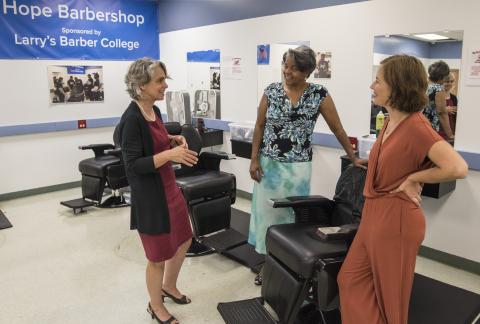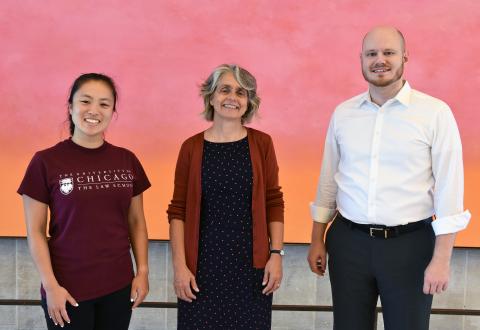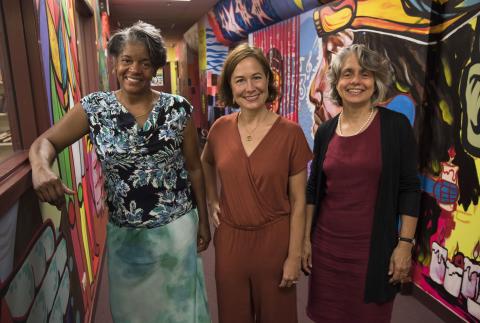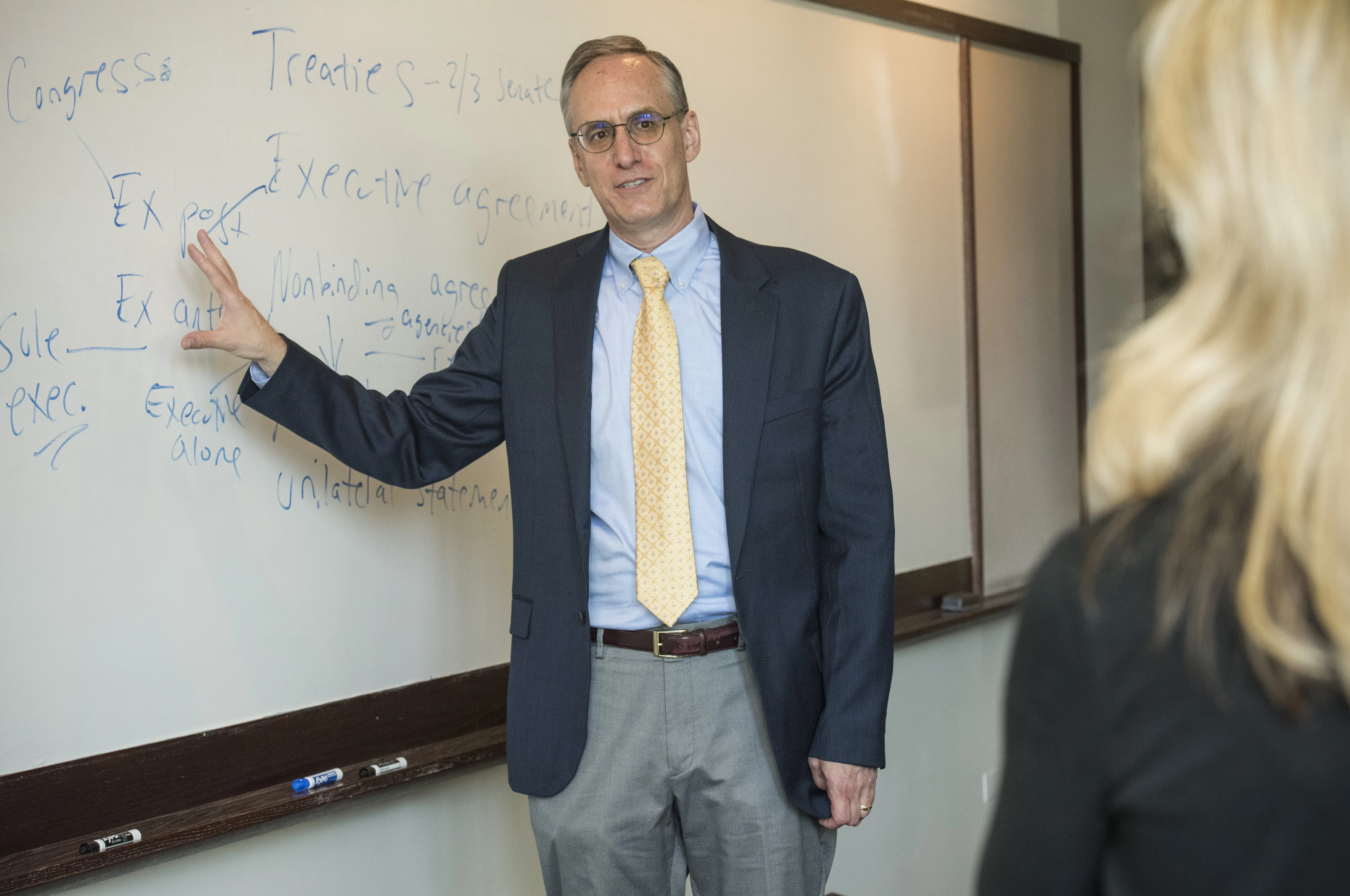‘Challenged beyond Their Wildest Dreams’
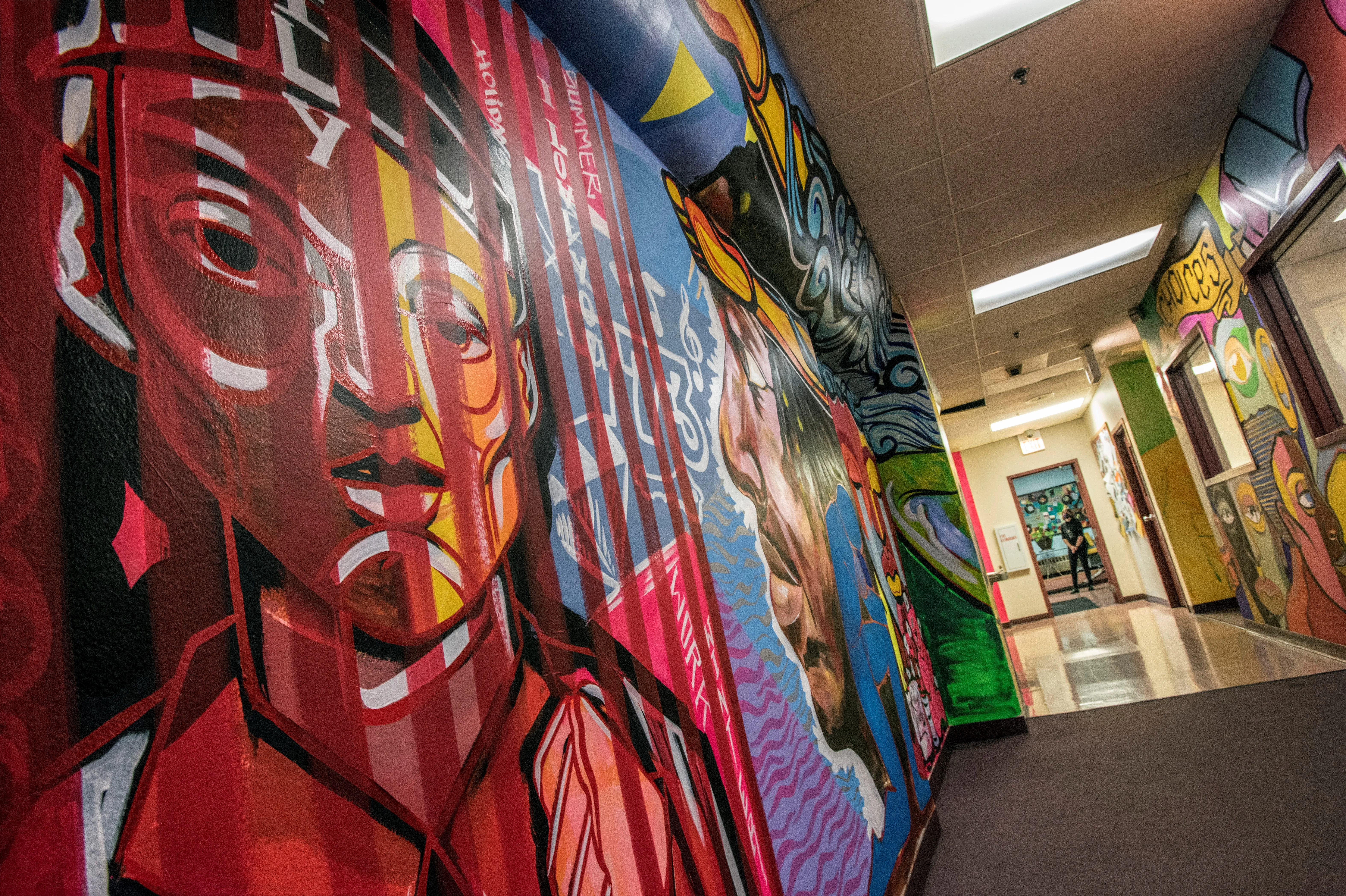
It was the third week of a virtual Law School seminar in which Professor Emily Buss and 10 law students were teaching incarcerated teenagers about their constitutional rights, and the topic was divisive: the right to own and carry a gun.
Each of the seminar’s 10 weeks would cover a different topic—including freedom of speech, reproductive rights, and cruel and unusual punishment—and each session would expand the views of both the Law School and high school students.
But, for the soon-to-be-lawyers, Buss said, none was quite as eye-opening as the debate on gun rights.
“This is a group of law students who are big believers in gun control,” said Buss, the Mark and Barbara Fried Professor of Law and an expert on children’s and parents’ rights and the relationship between parent, child, and state. “But they’re talking to kids who have grown up in very violent communities, so the youth felt strongly that everybody should have the right to carry a gun. The youth believe that having a gun is necessary for personal protection—that they are in great danger if they don't have one.”
In previous years, Buss led Law School students in teaching teenagers from the University of Chicago Laboratory High School and Woodlawn Charter School. During those classes, they discussed and debated issues related to the rights of minors, including free speech in public schools, school searches and drug tests, disciplinary procedures, and racial diversity in school placement.
In the spring of 2021, for the first time, Buss created a new version of the class geared toward youth who were incarcerated.
During the seminar, about 10 high school students in the Illinois juvenile justice system worked closely with Law School students to learn about their constitutional rights through a curriculum shaped by their experiences and interests. Heidi Mueller, ’07, who is the director of the Illinois Department of Juvenile Justice and worked with Buss to launch the new class, hoped the collaboration also would give the law students a glimpse of how the laws they discussed in class could adversely affect the most vulnerable people.
“I wanted them to be able to think more deeply, and in a more personal way, about the law and about the people who are impacted by these intellectual debates that we’re having,” Mueller said. “The reality is that law on paper is only as good as its implementation. And one of the things that the [law] students really learned was that all of these rights that are enshrined in the Constitution are routinely violated—especially in poor Black and Brown communities.”
During that third week, when the high school students resisted arguments for gun control and elaborated on their need to protect themselves and their families, the law students gained a new and invaluable perspective, Buss said.
“The law students were really shocked by this discussion,” Buss said. “It doesn’t mean they all suddenly changed their positions on gun control, but they realized it was more complicated than they had thought. For these kids, the world out there doesn’t protect them, there don’t seem to be adults protecting them, and police are not a source of support or protection either.”
***
Initially, Buss had considered teaching another class with high school students from the Lab and Woodlawn Charter schools. But having a daughter in high school herself, Buss was wary of suggesting young people spend even more time on Zoom. She had also long been in touch with Mueller, her former student and research assistant, who was now leading the Illinois Department of Juvenile Justice (IDJJ). It was during one of their conversations that Buss first came up with the idea for the seminar.
“It was something I’ve always had an interest in doing—engaging in this kind of class with youth who are incarcerated—but it always seemed logistically difficult,” Buss said of the seminar, which she taught in tandem with the Law School class Constitutional Law VII: Parent, Child, and State.
“Being able to do this class was sort of a way of making lemonade out of Zoom,” she added.
Buss and Mueller got to work enrolling high school students in IDJJ, whose ages ranged from 16 to 19, and law students. Because the class was virtual, students from different youth centers across IDJJ were able to participate. The students met once a week to cover a particular right, both as a large group and in smaller group discussions. Each law student was also paired with one high school student, and these pairs had one-on-one video calls every Saturday.
When Buss taught students from Lab and Woodlawn Charter, they focused primarily on school-based rights. For this class, she wanted to cover a broader range of rights of interest to adolescents, particularly adolescents who have been involved in the justice system. The students were interested in discussing criminal procedural rights, including protections against unreasonable searches and seizures and cruel and unusual punishment, but they were also very interested in reproductive and parental rights, voting rights, and speech rights.
Tresa D. Dunbar, the superintendent for IDJJ’s school district, also helped develop the curriculum and class structure. There was so much to be gained through a collaboration between the Law School and IDJJ, Dunbar said—it was a chance to expose the students in her district to people of different backgrounds, to teach them practical skills that would help their confidence grow, and even to offer a new perspective on the criminal justice system.
“One of the goals overall was to have them to see a different side of the authority of law and to give them practical information about how the law works, how it can be used responsibly, and how it should be used responsibly,” Dunbar said. “One of the things we did accomplish was to help them see that there are different sides to what is supposed to happen in the legal system.”
Buss knew that many law students would enroll in this class with an interest in supporting the underserved. She also hoped the class discussions would push them to think differently about the law and what it means to be a lawyer.
“One thing that many of [the law students] said to me is that they felt challenged beyond their wildest dreams,” Buss said. “[The class] really pushed them so far out of their comfort zones—in a good way. Some of them want to do criminal defense, some of them want to do some other kind of civil rights–related work. Having an opportunity to have their eyes opened in this way was really valuable.”
***
At the outset, Mueller stressed how important it was that the law students show up, commit, and engage fully with the teenagers enrolled in the class.
“It was so important that [the law students] followed through for our IDJJ students, because they have been let down by so many people throughout their lives,” Mueller said. “And [the law students] all committed. They showed up every week on Tuesday for the class, and they showed up every Saturday to work with kids individually. I was really impressed by how they took that to heart.”
Angela Chang, ’22, who was a Teach for America Corps member before law school, enrolled in the seminar in part because she was excited to give the IDJJ students a classroom experience they might not normally be able to access. The different rights covered each week had varied significance for the high school students, she said. For instance, the student she worked with one-on-one was a father, and he was particularly interested in parenting and reproductive rights.
“He had big concerns knowing that he had been in the juvenile justice system and that he had been away from his kids for however long he was there,” Chang said. “He was really interested in knowing what his rights were as a father, and whether he could get custody. He had strong opinions about that because it affected him really personally.”
Andrew Zeller, ’22, also joined this class with a teaching background—right before starting law school, he worked for Purdue University to help start a network of polytechnic high schools. One of the biggest challenges in teaching youth who were incarcerated, he said, was navigating discussions about the ways in which the young students’ rights had been violated.
“We all have the right to be free from cruel and unusual punishment. We all have a right to be free from unreasonable search and seizure,” Zeller said. “But for the most part, none of us [law students] have ever experienced those things being violated.”
Working with the IDJJ students, he added, meant finding a balance between teaching the material and allowing time to listen to the teenagers’ stories and experiences.
“On the one hand, we want to provide value and we want to provide learning. There are things from an academic standpoint or even a practical standpoint about these rights that we want to communicate,” Zeller said. “But at the same time, we have to make space for and recognize the contributions of the students themselves—when they’re saying ‘This is what this is really like, this is what happens to me and my family in relation to search and seizure,’ or in relation to an aspect of their sentencing or punishment. One of the most valuable things for us was to let the students talk and just listen.”
Working with young people who are incarcerated, Dunbar said, it is important to instill in them that they are not what they have done, or what they have been accused of doing. For that reason, she and her colleagues often remind the IDJJ students to be careful about what they share from their pasts. Nonetheless, Dunbar added, the high school students felt empowered throughout the seminar to bring up the relevant experiences they were comfortable sharing.
“Our youth took everything in the constitutional rights syllabus that we talked about and they applied it, as any good student would, to their own experiences,” she said. “And every week, the law students were more passionate and engaged and asking questions—that were appropriate—about how [the high school students] related to what they were talking about.”
For example, when it came to the discussion on the Second Amendment, Buss said, the high school students brought theoretical conversations about gun control back to their lived realities.
“To the extent the high school students acknowledged that a community with fewer guns would be a safer one, they voiced considerable skepticism about the effectiveness of gun control laws in achieving that end,” Buss said. “Such laws, they noted, would be unlikely to affect the plentiful supply of guns that they knew, from lived experience, were readily available on the street.”
Talking with the law students, Mueller stressed the role that trauma plays in the lives of these young people. It cannot be overestimated, she said—no conversation about rights is merely an interesting debate. Often, it is deeply personal. The reality of this trauma became even more evident to the law students when, a few weeks into the class, one the high school students made the decision to leave the seminar.
“The explanation he gave for withdrawing made a deep impression,” Buss said. “He had been very engaged leading up to this, but he basically said that he learned, in the course of this class, about all the rights that he had been deprived and that it was very upsetting to him. Of course, there could have been plenty more going on, but part of the story was that learning how things were supposed to work, how he should have been treated, and wasn’t, was too upsetting to him.”
Chang, who is interested in pursuing a career in criminal law, made an effort to ask her student about his experiences with lawyers. “I asked him, as someone who wants to be a lawyer and potentially might do either criminal prosecution or defense, ‘What would you want your lawyer to do? What would you want prosecutors to do?’” Chang said. “And he basically said, ‘Explain to me what's happening—because the lawyers don’t always do that, they’ll just tell me sign something, or tell me this is how it's going to go. They just sort of tell you—they don't really engage with you as a client.’”
These one-on-one conversations will stick with her long after she finishes law school, she added.
“I felt like I really enriched my own learning by engaging in these topics and hearing from someone who is a lot more closely affected by the rights we were talking about than I am,” Chang said. “Going forward as an attorney, it’s definitely something I’m going to carry with me.”
***
On the first day of class, Buss asked the high school students to rank the rights they discussed in order of importance—and at the end of the class, they ranked them again. Buss, Dunbar, Mueller, and the law students were surprised to find that across the board, freedom of speech ranked first both at the start of the seminar and at the end.
“Also, in polling the law students, that’s essentially where they came down, too,” Mueller said. “It was so interesting that after we had been through this class where we’re recognizing that everyone’s experience with the law and their constitutional rights is so different, that everybody coalesced around the idea that the First Amendment is really the most important of our constitutional rights.”
Mueller was surprised by the ranking, she added, but after further reflection it made perfect sense to her.
“I stopped for a minute and thought about it,” Mueller said, “And I thought, ‘Well, we are all American.’ Freedom of speech is such a core American principle that it has seeped into all of us. No matter where we come from, no matter what our experience is, this core cultural value is really part of the American experience.”
By the end of the class, Buss hoped the IDJJ students better understood their rights and had developed the skills to argue and defend their positions on them. Dunbar hoped they left with a sense of pride in their accomplishments, and an understanding of what they are capable of moving forward.
“To have them be in a place where they understand that their visions, goals, and objectives matter just as much as the next person—that they can compete in that space and that they should be in those spaces—that’s what I hope they walk away with,” Dunbar said. “And I think overall [the IDJJ students] that were in this class do understand that they can do it, and that they are worthy of these types of opportunities.”
As the class neared its end, Mueller said, students from different IDJJ facilities took pride not only in their own achievements, but in the achievements of their peers.
“At the end of the class, kids from different youth centers, who hadn’t met each other except for in this class, were really encouraging and lifting each other up,” Mueller said. “They were saying things like, ‘You’re smart, you can do anything, look at what you did, you had good things to say in this class, I liked hearing what you had to say.’ I found that so beautiful and moving. That right there was my highest hope for what they would get [out of this class].”
Teaching in the class made it clear to Chang that individuals should learn about their constitutional rights as early as they can, before they are adults—particularly those who are most vulnerable to having their rights violated.
“I think it’s really important for students in this demographic in particular to know what their rights are, and to know that they have a voice and can stand up for themselves,” Chang said. “And talking with my student—that was something he definitely thought was true as well. We thought that kids as young as 10 or 12 should understand that their rights are protected, and know that if any of those rights are violated, there is something they can do about it.”
Zeller hoped the high school students left the class with a new sense of what they could accomplish in the future, whether it was going to college, starting a business, or even becoming a lawyer. A high point for him was realizing that the students were eager to share what they had learned in the class with other young people.
“One of the students was released [from IDJJ] while we were in the program,” Zeller said. “And one thing she expressed was that she was excited to be able to teach her friends about these rights. Before the class, she didn’t really know much about these rights, and she knew they didn’t know much about them either. Now, she had this knowledge that she could give them.”
